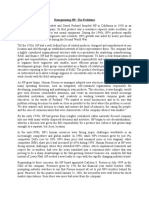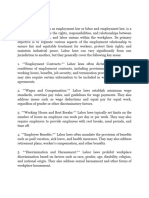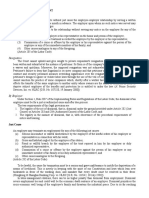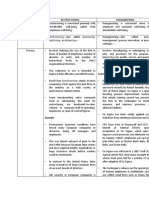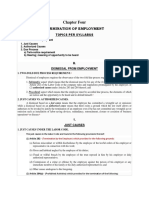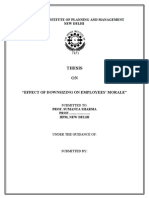CIA-2
MANAGING CONFLICTS AND NEGOTIATIONS
UNDER THE GUIDANCE OF
Dr. Deepti Sinha
March 2023
Negotiate with your employer for a ‘Hybrid Work Arrangement’
report
SUBMITTED BY
Rashmi Rathi: 22221065
Sinu Singh: 22221075
Tiju John Thomas: 22221056
Vishal Kumar Barnwal: 22221058
Fiza Nazneen: 22221060
3MBA
1
� INDEX
Sr. Table of Content Page
No. No.
1. Introduction 3
2. Challenges faced by Meta & IT industry 4
during pandemic
3. Regulations by Meta 5
4. Concerns of Customers & suppliers 6
5. Arguments 7
7. Concepts, Techniques and Models 8-10
8. Terms of Negotiations 11
9. Recommended actions for Win-Win 12
negotiations
11. Conclusion 13
12. References 14
2
� INTRODUCTION
A layoff refers to the temporary or permanent termination of employment of an
employee by their employer, often due to factors such as downsizing,
restructuring, or financial difficulties. These are typically a result of a
company's need to reduce costs or to adjust to changes in the business
environment. It may affect individuals or groups of employees. It is used
interchangeably with terms such as redundancy, retrenchment, or downsizing.
The IT sector is not immune to layoffs due to various reasons, including
changes in market demand, technological advancements, mergers and
acquisitions, or financial difficulties. Layoffs in the IT sector can affect
employees at different levels, including software developers, engineers, project
managers, etc. It may not always be due to external factors but also due to
performance issues, skill gaps, etc. In recent years, the COVID-19 pandemic
has also affected the IT sector, leading to layoffs as businesses have had to
adjust to remote work and changes in customer demand. Since 2022, big tech
has fired almost 2.6 lakh workers.
Meta, formerly known as Facebook, is a large technology company that
provides social media and advertising services. In the past, Meta has announced
layoffs in response to changing market conditions, such as a decline in
advertising revenue or shifts in user behaviour. For example, in 2018, the
company announced it would be restructuring its product teams, resulting in the
layoff of hundreds of employees. It reduced its workforce by 13% and extended
a hiring freeze through the first quarter of next year.
3
� CHALLENGES FACED BY META & IT INDUSTRY
DURING PANDEMIC
Some of the challenges faced by the industry during the pandemic include:
1. Remote work and IT infrastructure
2. Supply chain disruption
3. Cybersecurity threats
4. Increased demand for IT services
5. Economic uncertainty
Some of the challenges faced by Meta during the pandemic include:
• Increased demand for services: The company had to quickly adjust to
the increased traffic and usage of its platforms, which put a strain on its
infrastructure and support teams.
• Shift to remote work: Meta had to quickly shift to remote work to
comply with social distancing guidelines. This change required the
company to make significant changes to its operations and IT
infrastructure.
• Advertiser uncertainty: Reduction in advertising spend affected Meta's
revenue streams, as the company generates most of its revenue through
advertising.
• Regulatory challenges: The pandemic also impacted Meta's ability to
address regulatory concerns related to privacy, data protection, and
content moderation.
4
� REGULATIONS BY META
A relatively recent regulatory strategy called meta-regulation pushes businesses
to go above their societal obligations. The combination of responsive and
reflexive modes of regulation forms the basis of this strategy. In order to make
it simpler for the regulators to incorporate the fundamental ideas of corporate
social responsibility into corporate self-regulation, there is an effort being made
to merge the patterns of private ordering and state control. It is most effective
from the standpoint of the struggling economy.
Its security and safety teams have grown fourfold to 40,000 individuals, and
have created new privacy technologies. Also, they are collaborating with other
digital companies to make it simpler for users to safely transfer their data
between platforms. The Meta Stack Exchange community has established laws
to ensure the site operates efficiently. These rules, which can range from voting
policies to content restrictions, are upheld by both moderators and users. The
most typical rules include refraining from harassment or trolling, promoting
oneself, asking the same question more than once, publishing comments that are
off-topic, and not uploading any unlawful materials.
Some of the general regulations that Meta has implemented in the past:
1. Community Standards: Meta has a set of Community Standards that
outlines what types of content are allowed on their platforms, such as hate
speech, bullying, and harassment.
2. Advertising policies: Meta has strict policies on advertising, such as
prohibiting ads that promote illegal products or services, misleading
content, and discriminatory practices.
3. Privacy policies: Meta has privacy policies that outline how user data is
collected, used, and shared on their platforms. They have also
implemented features like two-factor authentication and data download
options to give users more control over their data.
4. Content moderation: Meta employs content moderators to review and
remove content that violates their policies, such as hate speech, violence,
and terrorism.
In addition to its own policies, Meta is also subject to external regulations and
laws in the jurisdictions where it operates. For example, in the United States,
Meta is subject to regulations such as the Communications Decency Act and the
Children's Online Privacy Protection Act.
5
� CONCERNS OF CUSTOMERS AND SUPPLIERS
Customers may become concerned when a business-like Meta announces
layoffs. These are some possible worries customers may have in response to
Meta's layoffs:
Consumers may be concerned that the layoffs would cause product
development to be delayed or that there will be less money available to
maintain and improve current goods, which might result in a lower-
quality experience or fewer features.
Meta may see higher wait times or a decline in the quality of help if a
considerable percentage of its workers are laid off.
Consumers that depend on Meta for advertising or other services may be
worried about how this would affect their company.
It may raise the danger of data breaches or other security problems.
Consumers who have partnerships with Meta could be worried about the
longevity of their efforts or the accessibility of supplies and assistance.
They could worry that layoffs indicate financial trouble or a lack of
stability, which might result in a decline in trust and loyalty.
Employer layoffs at a business like meta may also affect the suppliers of that
business. The following are some possible worries:
They may be anxious about collecting payment for unpaid bills or work
performed prior to the layoffs. They may be concerned that it may
postpone or even fail on payments.
It may reduce demand for goods or services from Meta's suppliers.
Hence, they are concerned about losing a large customer and the impact
on their own business.
While meta may convey layoffs to suppliers, the information may not be
precise enough for suppliers to grasp the entire nature of it. They may
want more transparency in order to understand how they will be affected.
They may be subject to contractual requirements, such as minimum order
quantities or exclusivity agreements. Facebook may no longer be able to
meet these responsibilities and suppliers may be concerned about their
contractual rights.
Overall, Meta’s open and honest communication may help allay some of these
worries and allow both customers and suppliers to make plans and adjustments
as necessary.
6
� ARGUMENTS
Meta disclosed a significant round of layoffs that affected 13% of its workers.
CEO & co-founder Mark Zuckerberg said in a statement, “I want to take
accountability for these actions and for how we got here.” The announcement
comes at a time when businesses across the technological spectrum have made
sizable waves of layoffs in recent months. Considering that Meta now employs
87,000 individuals worldwide, 11,000 of those employees will be quitting the
company. Each US employee will receive 16 weeks of severance compensation,
plus an additional two weeks for each year of employment, according to
Zuckerberg. Therefore, for instance, a four-year Meta employee would
essentially receive six months' compensation.
➢ Job security: Layoffs can make people feel insecure about their jobs
because they worry, they might be the next to leave.
➢ Financial impact: Those who are laid off frequently have financial
difficulty, as do their families.
➢ Mental health: Losing job might result in serious psychological damage
and distress.
➢ Loss of identity: Since many people define themselves in relation to their
profession, losing a job can result in the sense of loss of identity and self-
worth.
➢ Loss of community: When employees who have worked together for a
long period are laid off, they may no longer be able to rely on one another
for assistance.
Layoffs can have a terrible impact on employees and their family’s quality of
life. Due to the fact that persons who are laid off no longer have disposable cash
to spend, it can also result in a decline in consumer spending and a general
decline in economic activity. Arguments related to layoffs in the IT industry
include the following:
➢ The use of AI and automation, can lessen the necessity for human labour.
➢ A decline in the demand for particular services is brought on by market.
➢ The necessity of cost-cutting and productivity improvements to maintain
competitiveness.
➢ The requirement to spend money on modern services or technologies.
Arguments should be held in a meta-discussion manner during layoffs, which
calls for allowing all interested parties to express their views in a public setting.
7
� CONCEPTS, TECHNIQUES AND MODELS
Negotiation is a method of discussing problems internally and coming to a
solution that benefits everyone concerned. It is among the best methods for
preventing disputes and tensions. When people disagree with one another, they
gather, talk about the problem in a public forum, bargain with one another, and
then find a solution that works for everyone. It is also known as bargaining in
common parlance.
Following are the two real-world scenarios:
1. You want to go a movie, but you are aware that your parents won't
support your choice. So instead of arguing, you will sit with them and do
everything that you can to persuade and bargain with them without
getting into a fight. In this situation, your goal is to see a movie, and you
bargain with your parents or friends to make it happen.
2. Tom could not afford to lose the CD player because it was a rare item. As
a result, he tries to bargain with the business owner to lower the price so
that all parties can benefit financially.
In order to maintain peace and pleasure, negotiation is crucial in both
professional and personal settings. Example: Although you are aware that the
report is rather important and requires more time, your supervisor has asked you
to turn it in within two working days. If you don't submit it by the deadline,
your boss may be pleased with your yes at the time, but you'll get into a lot of
problems later. Negotiating with your supervisor is always preferable to
accepting something you know will be challenging. Ask your manager for more
time or perhaps avoid producing a lengthy report.
These are few tips for a successful negotiation:
o To fully understand & find the terms of the transaction to every bit.
o Pay attention to both your posture & your motions. Look assured. Avoid
looking around or fiddling with objects while speaking because if the
second party senses your anxiety, they’ll exploit you unfairly.
o Remember to dress properly. People won't take you seriously if you're
dressed casually. Display assurance. Focus intensely. One needs to be
8
� extremely clear about what they want. Maintain your resolve and
firmness.
o Pay attention patiently to what other people have to say. Avoid making
snap judgements and never speak during another person's speech.
o Be sensible and rational. Don't make a request that you already know
cannot be met. Don't cite something simply to quote something.
o Take your time closing the sale. But never make a conversation too long
or drag out any topic. Make sure the choice you make will result in a win-
win situation for everyone.
o Know where to make concessions. Accept the terms and conditions if you
believe they will improve the situation and cause you little harm. One
must occasionally make a compromise.
o Also crucial to bargaining is communication. Talk precisely and loudly.
Nobody should mislead other people. One of the biggest dangers to
negotiation is wordplay. Never make vulgar or disparaging comments
about anyone.
o It is usually preferable to sign a contract in person or have anything in
writing so that nobody later withdraws.
o The entire team should be on the same page to avoid conflicts.
Following are the Bargaining Models:
1. Win-Win: It is the most popular model, wherein every party to a
negotiation comes out ahead. No one loses anything, and everyone gains
something from it.
2. Win-Lose: Under such a paradigm, one side profits while the other party
is still unhappy after multiple rounds of conversations and negotiations.
3. Lose-Lose: In this model, the result of negotiation is zero, as the name
implies. This paradigm offers no benefits to any stakeholder. The parties
are typically unwilling to accept one another's points of view and are
averse to making concessions.
4. RADPAC: It is a popular model of negotiation in corporations. Each
letter stands for something:
9
�Rapport: As the name implies, it refers to the relationship between the
participants to a negotiation. The parties involved in a negotiation should
ideally feel at ease and get along well with one another.
Analysis: One party must have a thorough understanding of the other.
Everyone needs to give each other their whole attention.
Debate: In this round, the parties to the negotiation will debate several
topics. An idea's advantages and disadvantages are weighed. In this
round, one must maintain composure and avoid losing his temper.
Propose: In this round, each participant offers his best idea and arrive at a
consensus that is acceptable to everybody.
Agreement: At this point, people reach an understanding and accept the
best option.
Close: The deal is sealed, and both parties have left happy.
10
� TERMS OF NEGOTIATION
All parties concerned attempt to prevent conflict through negotiation while
agreeing on a compromise. Buyers and sellers, an employer and a potential
employee, a government of two or more nations can all be negotiating parties.
❖ Upholding principles: Principled negotiators speak for their own
interests. They might include agenda topics that only represent their
interests if they are negotiating as a team.
❖ Schedule: A strategy for the negotiation's course of action.
❖ Negotiation avoidance: A bargaining strategy in which the entire
conversation is completely ignored.
❖ BATNA (Best Alternative To a Negotiated Agreement): This is your
fallback strategy.
❖ Conclusion: The most important element showing the final decision.
❖ Buy-in: To persuade the other party to accept.
❖ Compromise: To reach an amicable agreement with the opposing party.
❖ Final: To review your major issues of agreement and disagreement.
11
� RECOMMENDED ACTIONS FOR WIN-WIN
NEGOTIATIONS:
❖ Developing a friendly and cooperative relationship
❖ Focus on interests, not positions.
❖ Examine various options instead of choosing the first solution put forth,
brainstorm and discuss a number of alternatives.
❖ Base the negotiation on objective standards that are pertinent to the issue
at hand rather than relying on subjective opinions or personal preferences.
❖ Be Flexible and Open Minded, but also be up front about your priorities
and limitations.
❖ Ensure the agreement is precise and in writing.
❖ Once the negotiation is finished, follow up to make sure that both parties
are following through. It can increase trust and avert future disputes.
12
� CONCLUSIONS:
In conclusion, layoffs are an unfortunate fact of life in the IT industry, and Meta
is not exempt. The sector is faced with a number of difficulties, such as supply
chain disruption, cybersecurity threats, an increase in the demand for services,
and economic uncertainty. All of these elements may influence user behaviour
changes and a decline in advertising revenue, which may force businesses to
restructure and eliminate positions.
Meta experienced a significant round of layoffs that affected 13% of its
workforce. Even though the layoffs were widely anticipated and rumoured,
those affected were still greatly impacted. The rules established, such as the
provision of severance pay, demonstrate the company's willingness to accept
responsibility for its actions and make an effort to lessen the negative effects of
layoffs. In terms of negotiation principles, it is essential for all parties to seek a
compromise, stand by their convictions, take into account the viewpoint of the
other party, control their emotions, and know when to yield.
Win-win agreements can be negotiated using terms of negotiation like the
anchor and modification, schedule, aiming point, negotiation avoidance,
negotiation zone, BATNA etc. Even in challenging circumstances like layoffs,
negotiations can result in long-term positive outcomes by aiming to reach a
settlement that benefits both parties. In the end, it is crucial for businesses to
approach layoffs with compassion and a dedication to lessening the impact on
their employees.
13
� REFERENCES:
• https://en.wikipedia.org/wiki/Layoff
• https://theprint.in/economy/big-techs-laid-off-over-2-6-lakh-people-
since-2022-why-indian-industry-will-face-limited-impact/1364896/
• https://www.bdodigital.com/insights/managed-services/it-management-
challenges-during-covid-19
• https://www.managementstudyguide.com/models-of-negotiation.htm
• www.bbc.com
• www.researchgate.net
• https://about.meta.com/regulations/
• https://link.springer.com/referenceworkentry/10.1007/978-3-642-28036-
8_710#:~:text=In%20regulation%20landscape%2C%20meta%2Dregulati
on,reach%20a%20public%20policy%20goal
• https://about.fb.com/news/2020/02/big-tech-needs-more-regulation/
• https://procurementtactics.com/negotiation-terminology/
• https://www.investopedia.com/terms/n/negotiation.asp
14































































